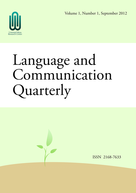


Volume 10 Issues 1-4 (2021-12-31)
Volume 9 Issues 1-4 (2020-12-31)
Volume 8 Issues 1&2 (2019-06-30)
Volume 7 Issues 3&4 (2018-12-31)
Volume 7 Issues 1&2 (2018-06-30)
Volume 6 Issues 3&4 (2017-12-31)
Volume 6 Issues 1&2 (2017-06-30)
Volume 5 Issues 3&4 (2016-12-31)
Volume 5 Issues 1&2 (2016-06-30)
Volume 4 Issues 3&4 (2015-12-31)
This study investigated English as a foreign language (EFL) freshman students’ perceptions of peer editing and the extent to which collaborative writing led to improvement in their essay writing. The participants for the study included a total of twenty-seven EFL freshman students enrolled in an English writing course at a state university in Turkey. Peer and teacher evaluation forms, personal notes in self-editing, and a semi-structured questionnaire as well as achievement tests were used to collect data about the participants’ perceptions of peer, teacher and self-revision, and writing performance. The findings revealed that EFL students had a sense of accomplishment and satisfaction, and tended to correct contextual and structural errors via peer and teacher revision in addition to individual efforts such as proofreading and rewriting after the revision. The findings also indicated that the tripartite essay writing process (self-editing, peer editing, and teacher editing) significantly contributed to the writing achievement of EFL freshman students. This study concludes with some implications for EFL essay writing classes to maximize the benefits in similar contexts.
The increasingly diverse cultural and linguistic makeup of today’s classroom compels educators to become more conscious of ways in which diverse populations communicate. This study investigated preferences in the use of space during communication amongst people from different cultures. Data was gathered through an online survey at two universities, one in Korea and one in the U.S., and via personal interviews with people from various cultural backgrounds living in the U.S. Analysis of the data revealed variations in preference of proximity across cultures according to familiarity, cultural origin, gender, status, and age. Familiarity and cultural origin emerged as the factors most widely and commonly mentioned in the participants’ responses as affecting spatial behavior. Status, gender, and age were also identified as factors affecting conversational distance from another person across the data sets. The paper concludes with specific classroom implications for educators which encourage a classroom environment that respects the spatial preferences of a diverse student population.
This study addresses the issue of teaching Greek language in a multicultural classroom of a primary school in the wider area of Menidi, in Attica, Greece. Particular focus is given to a learning profile of a non-Greek student and her special characteristics with respect to her performance in the particular language courses and, especially the Greek language course. It analyzes the representations of the child’s “otherness” regarding language as well as poses questions about the alternation between the mother language and the second one (foreign). Furthermore, based on the principles of communicative approach the study presents some strategies that contribute to easier and faster learning of Greek as a second language. More specifically, there is a reference to the mnemonic techniques using a semantic map, the use of dictionaries to get familiar with the alphabetic classification of words, games, the use of authentic texts, and the use of conjecture. It appears that the implementation of the strategies used, helped the student in effectively learning of the second code, getting accepted by peers more easily joining or more comfortable in the school environment. The school should recognize cultural and linguistic differences to increase understanding and mutual respect among students.
The 3rd Untested Ideas International Research E-Conference
Identifying Untested Practices
June 26 – 28, 2015
The 3rd Untested Ideas International Research E-Conference
Identifying Untested Practices
June 26 – 28, 2015